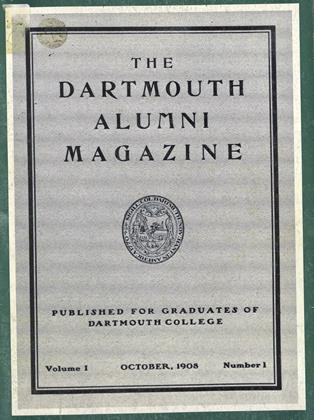An increasing number of American educators are realizing that this country's scholarship on the Soviet Union is woefully inadequate. And the fact that the number of students studying Russian at American colleges and universities in 1980 was half the number studying the language in 1968 has implications far beyond the classroom being, in addition, a matter with serious implications for U.S. foreign policy and national security. In response to the declining national interest in Soviet studies, a handful of Dartmouth students, spearheaded by Gordon Piatt '84, is trying to increase local understanding of Soviet affairs by bringing to the campus a series of speakers on various aspects of Soviet culture and politics.
Harrison E. Salisbury, a Pulitzer Prizewinning journalist and noted author on Soviet issues, inaugurated the series on October 6. Before a standing-room-only audience in the newly-completed Rockefeller Center, he addressed the question, "Can the United States and the Soviet Union co-exist?" A long-time New YorkTimes correspondent to Moscow and the author of several probing and widely acclaimed books on the Soviet Union, Salisbury applied his insider's knowledge as well as his innate optimism to affirm that the two superpowers can indeed co-exist and survive.
"If my hypothesis is accurate, they don't respond in the same way that we do," Salisbury said regarding the Korean airliner incident. A common fault of diplomacy, he noted, is assuming that the opponent is going to react the way oneself would. He also observed that neither country wants to destroy the other, that each only wants its policy to prevail. He cited some examples of exacerbated tensions, of international "games of chicken, and then confirmed that the state of affairs can be reversed. "If there's a will to do it, there's a way to do it," he said.
The series of speakers on Soviet topics will continue with a talk by former Secretary of State Dean Rusk on November 8, and with one on November 14 by Marshall I. Goldman, an expert on the Soviet economy and associate director of the Russian Research Center at Harvard University.
 View Full Issue
View Full Issue
More From This Issue
-
 Feature
FeatureDoubt and Passion: Notes on Contemporary American Novelists
October 1983 By Horace Porter -
 Feature
FeatureArtists in Residence
October 1983 By Churchill P. Lathrop -
 Feature
Feature40 Years at the Helm
October 1983 By Charlie Widmayer '30 -
 Feature
FeatureRudolph Ruzicka's Two Dartmouth Medals
October 1983 By Edward Connery Lathem -
 Feature
FeatureMeet Ted Leland
October 1983 By Brad Hills '65 -
 Feature
FeatureThe Widmayer Touch
October 1983 By Cliff Jordan '45
Article
-
 Article
ArticlePROFESSOR PAGE TRANSLATES PLAY OF ANATOLE FRANCE
February, 1915 -
 Article
ArticleA Busy Library
March 1954 -
 Article
ArticleThree New Dorms
February 1960 -
 Article
ArticleVanity of the Bonfires
OCTOBER 1991 -
 Article
ArticleTenth Mountain Division
APRIL 1994 -
 Article
ArticleTaking Ourselves for Better or Worse
DECEMBER • 1985 By Marlea Clark '86

